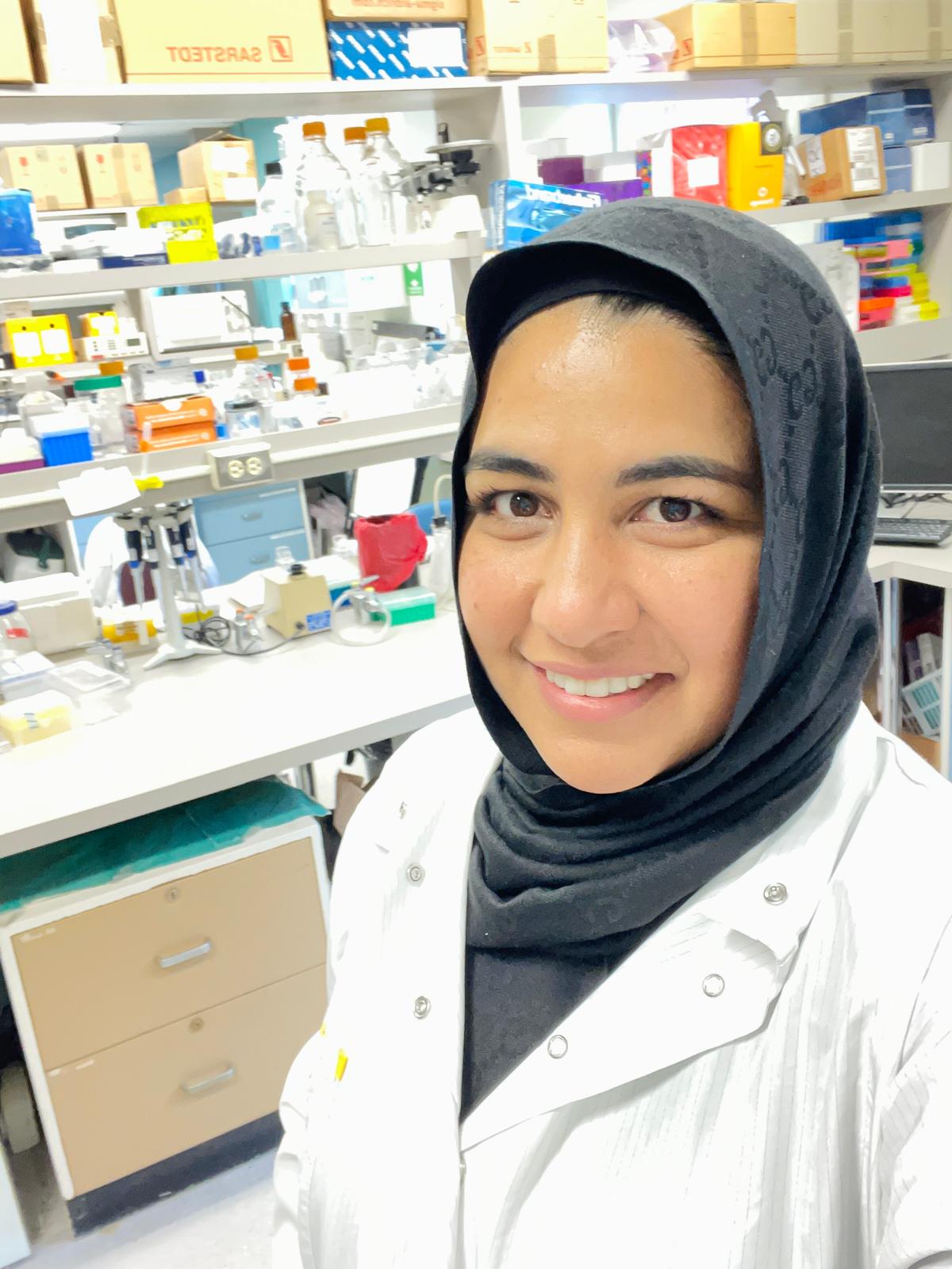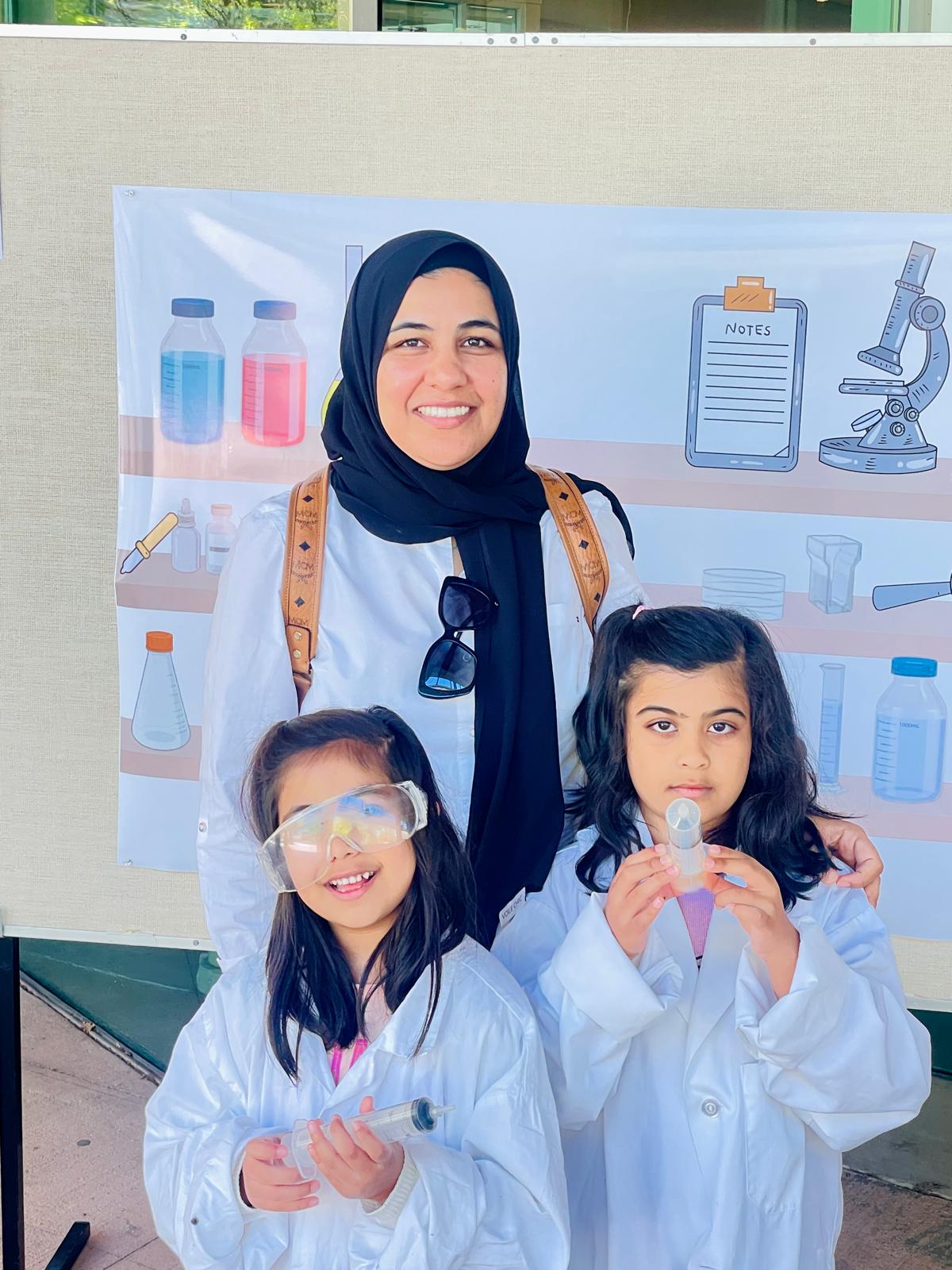Story by Basak Ashley Sahin. Edited by Tiffany Chang.

When Asma Tanveer moved to Canada from Pakistan 10 years ago, she brought with her a master’s degree in biotechnology and a passion for scientific research and its impact. Like many newcomers, she faced significant challenges in navigating credential recognition, an unfamiliar academic system, and the absence of accessible professional networks.
Asma is one of many trainees at HLI with a unique background and perspective. In June 2025, she was named HLI’s Equity, Diversity, and Inclusion (EDI) Person of the Quarter in recognition of her leadership, mentorship, and efforts to foster a more inclusive environment.
At HLI, Asma works on airway epithelial repair and drug responses in asthma models as a master’s student in the Dorscheid Lab in UBC’s Experimental Medicine program. She also contributes to outreach and mentorship through initiatives such as Geneskool: a Genome BC program that introduces high school students to genomics and biomedical research.
From personal experience to advocacy
Asma’s commitment to EDI is shaped by lived experience. “My commitment to EDI began with the realization that too many talented individuals are overlooked – not for lack of ability, but because of who they are. Having felt that invisibility myself, I was driven to act,” she says.
Since then, she has mentored women in science, contributed to outreach through Geneskool, and advocated for inclusion grounded in empathy and shared experience. “For me, EDI isn’t optional. It’s a responsibility to ensure everyone feels they belong.”
Her journey into biomedical research was shaped by mentors who offered support at key moments. She first connected with Dr. Sima Allahverdian, a former HLI researcher, through a mutual friend. Though Dr. Allahverdian had already relocated to Toronto, she generously offered guidance – recommending courses and encouraging Asma to pursue volunteer experience.
That connection led to an introduction to Dr. Gurpreet Singhera, a research associate at HLI and a manager of the Bruce McManus Cardiovascular Biobank. “Even with her full schedule, Dr. Singhera always made time for answering my emails or meeting for a coffee chat,” she says. “She helped me strengthen my application, introduced me to Dr. Del Dorscheid, and believed in my potential to contribute meaningfully to the lab.”
With their support, she joined the Dorscheid Lab as a graduate student. Looking back, she credits both mentors not only for their guidance but for modelling what inclusive mentorship looks like in practice. “Their belief in me made a lasting impact. It’s part of why I now feel so strongly about creating that same sense of welcome for others.”
Leading by example
Asma’s advocacy now includes mentoring early-career researchers, promoting inclusive lab practices, and contributing to outreach that reflects the diversity of communities served by HLI.
“EDI has shaped not just how I work, but why I work,” she says.“It’s helped me find mentors who value potential over credentials and communities that see difference as a strength. “
She believes inclusion begins with how people are welcomed and supported. “Sometimes, what holds people back isn’t a lack of talent, but a lack of confidence or the right platform to express themselves,” she says. “When we support others with respect and openness, we create the kind of environment where people feel seen – and when they feel seen, they shine. When they shine, we all benefit.”
That perspective was reinforced during a Mentor Walk session hosted by Tech2Step, where she was invited to speak on a science outreach panel. As the only racialized woman present – visibly Muslim, hijab-wearing, and of Pakistani and South Asian background – Asma says the moment reminded her that she was representing more than just herself.
“After the session, several attendees, especially young women, told me how much it meant to see someone who looked like them in that space. I realized I was part of something larger, a reflection of what’s possible.”

Creating space for others to thrive
Asma encourages others to take action, regardless of role or title.
“Start where you are. Improving EDI doesn’t require a title – small, consistent actions can create meaningful change. Your intention matters. The way you speak, listen, and show up shapes how others feel.”
She shares that there are many ways to contribute. She regularly offers coffee chats, connects friends and peers with professional opportunities, and volunteers as a parent at her children’s Catholic school and church events. She also leads an Islamic teaching circle in Vancouver – a space for reflection, learning and community building.
“In all spaces, I try to be of service in ways that honour others’ values and experiences – just as I hope mine are respected,” she says. “And I encourage others to do the same.”
Outside of the lab
Outside of her research and outreach work, Asma enjoys spending time with her husband and two daughters. They often play badminton together or unwind over a meal at The Old Spaghetti Factory, a family favourite in Vancouver.
“My family is my greatest source of strength and motivation,” she says.
Through her work, mentorship and advocacy, Asma Tanveer continues to advance both scientific inquiry and a culture of belonging, demonstrating that research and equity go hand in hand.

